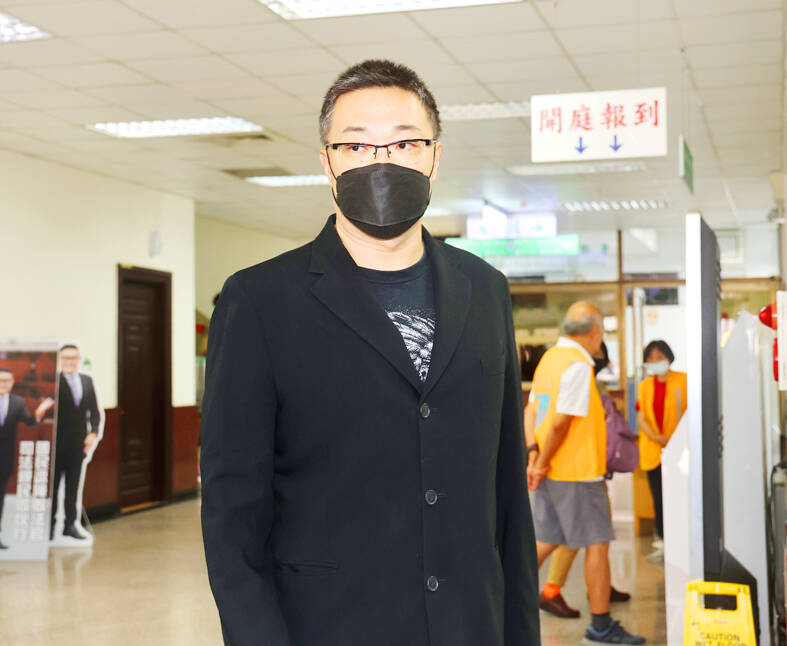An 11-month prison sentence was finalized yesterday for media personality Lucifer Chu (朱學恒), after he declined to appeal last month’s ruling by the High Court.
Chu was accused of forcibly kissing Chinese Nationalist Party (KMT) Taipei City Councilor Chung Pei-chun (鍾沛君) twice on the lips at a restaurant in 2022.
He in March was sentenced to 14 months in prison for indecent assault by the Taipei District Court, which he appealed.

Photo : CNA
On Nov. 14, the High Court in the case’s second ruling lowered Chu’s sentence to 11 months.
As the court had not received an appeal filing by 10:33am yesterday, the ruling was finalized, and Chu is set to serve his sentence, the court said.
At the time of the High Court ruling, Chu said on Facebook that he accepted the decision and would not file any further appeals.
The court said that Chu abused the trust of the victim to fulfill his own desires and acted indecently toward her, violating her bodily autonomy and causing her severe mental distress.
Moreover, during the first trial, Chu denied all wrongdoing and appeared on a televised talk show in which he mentioned the victim’s name while discussing a political topic, showing no remorse for his actions, or consideration for the victim and her feelings, the court said.
However, in the second trial, Chu admitted to the charges and expressed a willingness to reconcile and offer financial reparations to the victim, taking to social media to issue a public apology on his own accord, it added.
Although Chu and Chung have not yet reached a point of reconciliation, Chu has shown remorse and so received a shortened sentence, the court said.

The Chinese military has built landing bridge ships designed to expand its amphibious options for a potential assault on Taiwan, but their combat effectiveness is limited due to their high vulnerability, a defense expert said in an analysis published on Monday. Shen Ming-shih (沈明室), a research fellow at the Institute for National Defense and Security Research, said that the deployment of such vessels as part of the Chinese People’s Liberation Army (PLA) Navy’s East Sea Fleet signals a strong focus on Taiwan. However, the ships are highly vulnerable to precision strikes, which means they could be destroyed before they achieve their intended

The Taiwan Experience Education Program (TEEP) has funded short-term internships in Taiwan for more than 4,500 young people from more than 40 countries since 2015, with the goal of attracting and retaining international talent, the Ministry of Education said yesterday. Fifty-five colleges launched 514 projects this year, including in fields such as semiconductors, artificial intelligence, medicine and biotechnology, green energy, and sustainability, it said. The program provides research and practical internships in Taiwan for two to six months, and offers cultural exchange and networking opportunities, the ministry said. For example, National Formosa University’s Embedded System and Autopilot Laboratory developed two solar-powered drones in

GLOBAL: Although Matsu has limited capacity for large numbers of domestic tourists, it would be a great high-end destination for international travelers, an official said Lienchiang County’s (Matsu) unique landscape and Cold War history give it great potential to be marketed as a destination for international travelers, Tourism Administration Director General Chen Yu-hsiu (陳玉秀) said at the weekend. Tourism officials traveled to the outlying island for the Matsu Biennial, an art festival that started on Friday to celebrate Matsu’s culture, history and landscape. Travelers to Matsu, which lies about 190km northwest of Taipei, must fly or take the state-run New Taima passenger ship. However, flights are often canceled during fog season from April to June. Chen spoke about her vision to promote Matsu as a tourist attraction in

Taipei resident Mu Chu-hua caught some glimpses of China’s mighty military parade on YouTube on Wednesday. As she watched hypersonic missiles roll down Beijing’s Changan Avenue and troops march in lockstep, she did not feel like they posed a threat to Taiwan. Mu, a 69-year-old retiree, said she saw the parade as simply a way for Chinese President Xi Jinping (習近平) to “say thank you to the troops.” “I thought it was quite normal,” she said. “It was very cool.” China’s military parade commemorating the end of World War II was being watched internationally for insights into Beijing’s military advances and its show